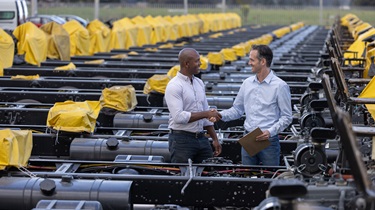
Ties that bind: Colombia remains strong trade partner with Canada
Author details
Janet Wilson
Senior international trade writer
In this article:
Colombia has a stable economy, business-friendly policies, and a free trade agreement with Canada—not surprising, it’s our nation’s fifth-largest bilateral trading partner in Latin America.
In 2022 alone, two-way merchandise trade between the two countries totalled $3.2 billion. Canada’s already a major investor and a recognized supplier of goods and services in sectors such as infrastructure, mining, financial and engineering services, oil and gas, energy, agri-food and education. It’s a trade and investment relationship that continues to strengthen, making Colombia a magnet for Canadian exporters.
Export Development Canada (EDC) is celebrating 10 years in Colombia, having opened our international office in Bogota, Colombia, in 2013.
“Since the beginning of our operations in Colombia, EDC has played an important role promoting commercial relations between our countries. We’ve been instrumental in driving economic growth and co-operation between our nations within a framework of environmental and social sustainability,” says Tamara Fathi, EDC’s chief representative, Andean Region, Central America and the Caribbean.
“EDC has been engaging with sponsors of large projects and key corporate accounts to better position Canadian companies and capabilities. We’ve also been developing relationships with key international and local companies operating in the region, as well as engaging with local and international banks and multilateral agencies to offer financing for projects with Canadian benefits,” Fathi says.
EDC senior economist Daniel Benatuil says despite concerns about possible regulatory risks arising from recent political shifts, Colombia’s robust political institutions are expected to support the continuation of its long-standing policy and business-friendly practices.
“This will remain a key factor in Colombia’s ability to continue attracting one of the region’s highest shares of foreign direct investment (FDI) inflows relative to the size of the economy,” adds Benatuil.
Geographically, Colombia is enviably located with access to both the Atlantic and Pacific oceans. It’s a gateway to the Pacific Alliance—a trading bloc comprised of Chile, Colombia, Mexico and Peru—with which Canada is an associated state. With a combined gross domestic product (GDP) of $2.5 trillion and more than 230 million consumers, the Pacific Alliance constitutes a key market for Canada.
Colombia remains committed to attracting FDI in power, infrastructure, and energy sectors, where Canada’s already a major investor and a recognized supplier of goods and services.
“Renewable energy development—alongside the promotion of agriculture, food production for self-sufficiency, and tourism—is an important policy priority within the Colombia government’s ambitious plans to diversify the economy away from hydrocarbon exports,” says Benatuil.
“That said, there’s ongoing uncertainty about the government’s stance respecting future hydrocarbon exploration to raise long-term production capacity and financially support energy transition efforts,” he says.
Key opportunities for Canadians
1. Power and anything related to non-conventional renewables such as solar and wind energy. About 70% of the Colombian power matrix is comprised of electricity, making it vulnerable to weather phenomena, like El Niño. For this reason, the government wants to diversify the power matrix and is encouraging investment in non-conventional renewables to make the system more resilient. We expect significant attention and investment in this sector.
2. Infrastructure. In 2023, the government prioritized nine projects worth US$4 billion, mainly in road concessions. Port and airport construction/renovations have also played an important role within this sector. Canada has a lot of expertise and capabilities within this cluster and is attracting the attention of potential investors.
3. Extractive industries. Canada is well-known in Colombia for its expertise in extractives and a model for responsible development of natural resources, and anti-corruption and environmental, social and governance (ESG) practices that respect international standards. There are a lot of similarities between the Albertan foothills and the Colombian geography, which is why Canadian operators feel comfortable in Colombia and have become some of the most important companies in exploration and production in the country.
4. Cleantech is key. Cleantech is a priority sector for the Colombian government, which has established a goal to increase the integration of non-conventional renewables in the power matrix, from the current 1% to almost 30% by 2030. It’s a very ambitious goal and will require investments of up to $6 billion. Colombia will seek to reduce carbon emissions by 51% by 2030 and be carbon neutral by 2050.
Canadian companies are innovative and focused on enhanced recovery and unconventional development. This innovation has a trickle-down effect into environmental technologies, geomatics, information technology and communications (the digital oilfield), and health and safety equipment.
You should also check out
Maximize your company’s success in Brazil, Chile, Colombia, Mexico and Peru
Risks of exporting to Colombia
- Complicated and changing tax regime. Periodically, the government introduces new tax bills—tax reforms that, of course, have an impact on business, and the way people conduct their operations. Canadian exporters and investors, interested in doing business in Colombia, should consult legal professionals for sound advice and make sure it’s reflected in their business plan.
- Political environment. Latin America has a very dynamic and changing political landscape. There’s no dull moment when it comes to its politics. It’s important to keep this mind when considering a market because of the implications it could have in terms of country risk.
- Volatile currency. Most Latin American economies are commodity-dependent, so fluctuations in commodity prices or changes in the economy and customer buying habits could have a direct impact on your business. In Colombia, 2022 was a very volatile year given political changes that led to a significant devaluation of the Colombian peso, whereas in 2023, it’s a top performer among emerging market currencies.
Advice to Canadian exporters
“The one piece of advice that I give Canadian companies considering Colombia as a business destination is that this is a relationship-based culture. It’s very important to take the time and energy to build relationships, build your network because it’s all about trust. Once you earn trust, business will follow,” says Fathi, who wrote an article on the top etiquette tips for doing business in Colombia.
Spanish is the official language of most countries in Latin America, but English is accepted within the business community. Learning basic words in the local language will demonstrate your interest in establishing solid relationships over the long run. Working with a local partner can also help you overcome language barriers. Business takes longer in Colombia than it does in Canada, and can often feel like it’s one step forward and two steps back. Don’t get discouraged.
If you’re already exporting abroad—or plan to—a good environmental, social and governance (ESG) strategy can help improve the value of your products and services, while decreasing the negative impacts of your company on people and the environment. Using ESG principles effectively can help you identify, prevent and mitigate the potential and/or actual environmental and social risks while doing business in Colombia and beyond.
Did you know?
- Colombia is Latin America’s fourth-largest and South America’s third-largest economy.
- It’s the most biodiverse country in birdlife and second most biodiverse country in the world (second to Brazil). More than 9,100 species can only be found in Colombia.
- Colombia is roughly the size of Portugal, Spain and France combined (Canada is nine times bigger).
- Top exports:
1. Mineral fuels, including oil
2. Coffee, tea, spices
3. Gems, precious metals
Short-term risk rating: Medium-high
- Top Canadian exports (2022): Cereals, fertilizers, vegetables, newsprint, pharmaceutical products
- Canadian exports total value (2022): $1.28 billion
- International trade agreement with Canada: The Canada-Colombia Free Trade Agreement (FTA) came into force in August 2011. In June 2017, Canada launched FTA negotiations with the Pacific Alliance.
- Population: 51.8 million
To contact an EDC export advisor, visit our Export Help Hub. To explore the potential of growing your business, connect with our market entry advisors before exporting to Colombia. Doing business with international customers can be more complicated, so EDC has developed a number of solutions to make your transactions easier and safer.
Check out EDC’s Country Risk Quarterly, which highlights economic uncertainty and opportunity at the global and country level. It also identifies the issues that affect the country risk rating to help you make informed trade and investment decisions.
The Trade Commissioner Service (TCS) has several trade commissioners working out of the Canadian embassy in Bogota. They’ll save you time and money by introducing you to vetted local contacts—agents, distributors, lawyers, accountants, translators, plus every other service professional you’ll need to succeed in Colombia.


















